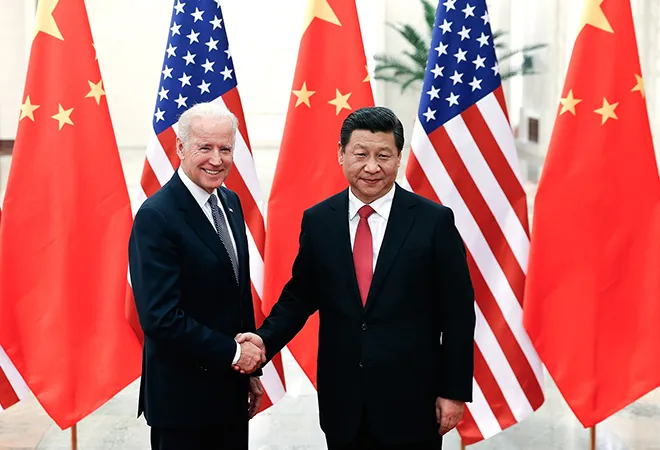-
CENTRES
Progammes & Centres
Location

In between 1947–1953, a miracle occurred. Despite a transition in power from one political party to another, despite the anti-Communist hysteria whipped up by the ‘Red Scare’ of the odious Senator Joseph McCarthy, despite a country uncertainly feeling its way to superpower status, the United States managed to come to a broad political and geostrategic consensus over the most important issue of its day: How to deal with the Soviet Union, its rival superpower in the new global system.
From the ancient Greeks onwards, democratic systems had always been denigrated as being incapable of hewing to a common foreign policy geostrategy for long, given the vagaries of constant elections and the structural inability of major parties to leave politics at the water’s edge. Yet remarkably, throughout the Cold War of 1947-1991, the US managed to sustain the dominant containment strategy forged in the late 1940s–early 1950s, despite the inevitable highs and lows in American life, and despite very different sorts of men serving as president over these many decades. So important was this consensus for the establishment of the American-inspired global order, that Dean Acheson—Truman's Secretary of State and one of the most successful people ever to have held the position—simply entitled his memoirs, Present At The Creation.
As a Democratic centrist, President Harry Truman saw off the leftist strategic option embodied by former Vice President Henry Wallace, who advocated appeasing Joseph Stalin and doing nothing to secure Western Europe (let alone the rest of the world) from communist domination. At the same time, the center-right Eisenhower saw off the far-right views of General Douglas MacArthur, who advocated a militaristic rollback of communist gains around the world, even if tactical nuclear weapons would need to be deployed.
Instead, despite their personal animus, Truman and Eisenhower jointly championed the containment doctrine, which called for the West engaging in a political conflict with communism, while drawing clear red lines around the world (such as in Berlin) that the US would defend from Soviet encroachment. Eschewing direct military confrontation with the Soviet Union—to the dismay of the far right—the US at the same time committed itself to a geopolitical competition with the USSR—to the frustration of the far left. In the end, the Truman-Eisenhower political-geostrategic nexus was crowned with incredible victory; the Soviet Union dissolved, just as the Containment doctrine had predicted, while the world managed to avoid a direct superpower confrontation and World War III.
Remarkably, a similar domestic-strategic consensus seems to be coalescing in America regarding how to handle the US’ new superpower rival, China. Outgoing President Donald Trump has supplied the first part of the consensus, while newly-elected President Joe Biden is well on his way to supplying the second.
In terms of being the first major American political figure identifying China as a dangerous and rising rival to the US, Donald Trump will surely be lauded by history; in fact, this will likely be seen as his most significant historical accomplishment. Before Trump, America’s bipartisan foreign policy commentariat was settled around the utterly erroneous and almost universally-held notion that the rise of China was likely to be benign and should be encouraged, as Beijing was certain to become a more status quo power and more pro-American as it became richer.
Then in the wilderness, Trump was one of the few voices warning the opposite. China’s rise would not make it a pillar of the present order, but instead, as a rising global power, it would seek to re-make the American-dominated world. It is a measure of Trump’s success over this one central geostrategic insight that he leaves behind a Washington where both parties are united—over this, if nothing else—in seeing the rise of China as a direct challenge to both the United States and the world order it has created.
Now, ironically, Biden finds himself reinforcing, and not overturning, Trump’s China policy, with the critical added tactical innovation of seeing this primary geostrategic contest in terms of cultivating allies as a means to geostrategic victory. Whereas Trump was all too often crudely transactional in terms of foreign policy—alienating the very allies who provide the US with an invaluable strategic edge over largely friendless China—Biden has gone out of his way to cultivate great powers India, Japan, and the Anglosphere to see off Chinese expansionism in the Indo-Pacific region.
Just this month, at the first ever leaders’ summit of the Quadrilateral Security Dialogue (The Quad)—a nascent anti-China strategic grouping in Asia comprising the US, India, Australia, and Japan—Biden broadened its agenda to include vaccine production, as well as the more usual strategic calls for freedom of the seas. In doing so, Biden is deepening the Quad’s agenda as it evolves into a nascent NATO.
However, it was at the initial Sino-American meeting in Alaska that the new foreign policy consensus was on full display. America and China’s top diplomats verbally attacked each other in unusually blunt terms. Secretary of State Tony Blinken castigated Beijing: For its inhumane treatment of the Uighurs in western China; criticised its anti-democratic crackdown in Hong Kong; underlined its increasing pressure on Taiwan; warned against any further cyber attacks on the US emanating from China; noted Beijing’s economic coercion of ally Australia (all for having the temerity to suggest an international conference be convened to look into the decidedly murky origins in Wuhan of the coronavirus).
Not to be outdone, China’s Yang Jiechi, Director of China’s Central Foreign Affairs Commission, gave as good as he received, blasting the US for its treatment of minorities and mocking its weak democratic structures. In a statement that will only solidify bipartisan US political support for Biden’s increasingly hawkish line, Yang mocked American staying power, saying, “The US does not have the qualification to say that it wants to speak to China from a position of strength.” Blinken grimly responded, suggesting China should not bet against the US.
And, indeed, 20th-century history is littered with the graves of authoritarian regimes who underestimated America: The Kaiser’s Germany, Tojo’s Japan, Hitler’s Reich, and Stalin’s Russia. In each case, America was thought weak, decadent, in decline, and incapable of staying the course. In each case, the authoritarian edifice crumbled before America’s surprisingly enduring domestic and geostrategic consensus.
This is now happening again. As was true for Truman and Eisenhower, once again two US presidents (Donald Trump and Joe Biden) who heartily disapprove of one another are paradoxically forging the domestic political basis to a geopolitical agreement over how to deal with America’s primary superpower rival that seems bound to stand the test of time.
The views expressed above belong to the author(s). ORF research and analyses now available on Telegram! Click here to access our curated content — blogs, longforms and interviews.

John C. Hulsman is President and Managing Partner of John C. Hulsman Enterprises a political risk consulting firm. He is also a life member of ...
Read More +